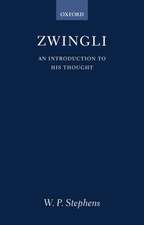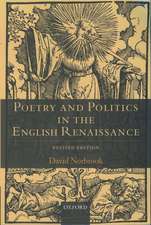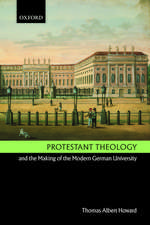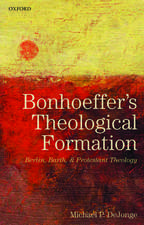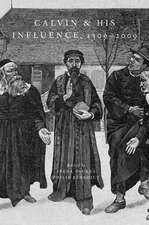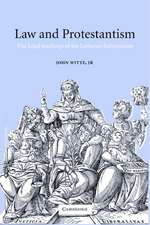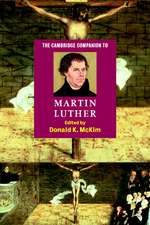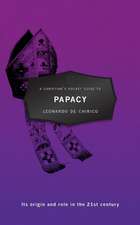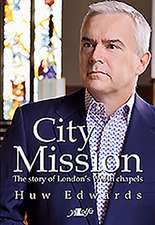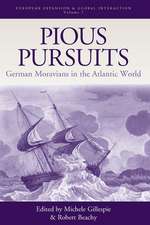Leibniz: Protestant Theologian
Autor Irena Backusen Limba Engleză Hardback – 19 mai 2016
Preț: 552.89 lei
Preț vechi: 791.47 lei
-30% Nou
Puncte Express: 829
Preț estimativ în valută:
105.83€ • 114.99$ • 88.95£
105.83€ • 114.99$ • 88.95£
Carte tipărită la comandă
Livrare economică 11-17 aprilie
Preluare comenzi: 021 569.72.76
Specificații
ISBN-13: 9780199891849
ISBN-10: 0199891842
Pagini: 336
Dimensiuni: 163 x 160 x 31 mm
Greutate: 0.59 kg
Editura: Oxford University Press
Colecția OUP USA
Locul publicării:New York, United States
ISBN-10: 0199891842
Pagini: 336
Dimensiuni: 163 x 160 x 31 mm
Greutate: 0.59 kg
Editura: Oxford University Press
Colecția OUP USA
Locul publicării:New York, United States
Recenzii
[I]t provides a wealth of new insights into the historical and theological background to some of Leibniz's central philosophical concerns and introduces some new ones.
Irena Backuss much-anticipated study of Leibniz as a philosopher-theologian examines significant trajectories of his ecumenical endeavors, in published essays, manuscripts and correspondence, on the Eucharist, predestination, and sacred history. Her work is noteworthy both for its approach as intellectual history and for its detailed examination of the history of Leibnizs efforts toward church union. The result is a significant contribution to our knowledge of late seventeenth- and early eighteenth-century religious, theological, and philosophical debate.
This groundbreaking book focuses on the doctrinal and ecclesiastical peculiarities of both Lutheranism and Calvinism, convincingly showing that Leibniz's efforts in view of the confessional union between the Lutherans of Hannover and the Calvinists of Brandenburg were based on his personal convictions and at the same time on his own philosophical doctrines, especially those relating to the problem of substance and to the question of freedom, necessity, and theodicy. This book fills in a serious gap in the Leibniz scholarship and, considering the far reaching influence of Leibniz's thought in the seventeenth and eighteenth centuries, will provide a precious reference for readers and researchers interested not only in the early modern theology, but also philosophy.
Irena Backus's book fills a major gap in Leibniz literature. A systematic study of Leibniz's theology fully grounded in the wealth of sources which have become available over the past century has long been awaited. Backus's superb command of the nuances of early modern Protestant theology in their historical contexts leads the reader to the discovery of key but neglected aspects of Leibniz's thought. This contribution will have a lasting impact.
will provide invaluable source material for scholars who wish to get a thorough view of this seventeenth-century philosophical theologian
Irena Backuss much-anticipated study of Leibniz as a philosopher-theologian examines significant trajectories of his ecumenical endeavors, in published essays, manuscripts and correspondence, on the Eucharist, predestination, and sacred history. Her work is noteworthy both for its approach as intellectual history and for its detailed examination of the history of Leibnizs efforts toward church union. The result is a significant contribution to our knowledge of late seventeenth- and early eighteenth-century religious, theological, and philosophical debate.
This groundbreaking book focuses on the doctrinal and ecclesiastical peculiarities of both Lutheranism and Calvinism, convincingly showing that Leibniz's efforts in view of the confessional union between the Lutherans of Hannover and the Calvinists of Brandenburg were based on his personal convictions and at the same time on his own philosophical doctrines, especially those relating to the problem of substance and to the question of freedom, necessity, and theodicy. This book fills in a serious gap in the Leibniz scholarship and, considering the far reaching influence of Leibniz's thought in the seventeenth and eighteenth centuries, will provide a precious reference for readers and researchers interested not only in the early modern theology, but also philosophy.
Irena Backus's book fills a major gap in Leibniz literature. A systematic study of Leibniz's theology fully grounded in the wealth of sources which have become available over the past century has long been awaited. Backus's superb command of the nuances of early modern Protestant theology in their historical contexts leads the reader to the discovery of key but neglected aspects of Leibniz's thought. This contribution will have a lasting impact.
will provide invaluable source material for scholars who wish to get a thorough view of this seventeenth-century philosophical theologian
Notă biografică
Irena Backus is Professor of Reformation History and Ecclesiastical Latin at the Institute of Reformation History at the University of Geneva.

